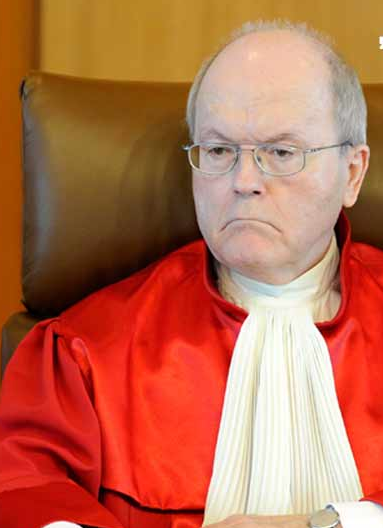

Image courtesy: campact.de
"The management of the EPO did some UPC spin with former (until very recently) IP Kat authors."Siegfried Broß (pictured above), who repeatedly explained the issues with the UPC, is back as a discussion topic after an IP Kat comment (mentioned here before) which SUEPO has just/must have noticed, adding that "[a]n article and a lecture by Prof. Dr. Siegfried Broß, former judge at the German Federal Constitutional Court of Karlsruhe."
SUEPO made copies and added: "Both documents incidentally also deal with the employment situation of staff members of international organisations."
One of our readers has meanwhile explained another reason to shun the UPC:
"The EPO and others close to Team UPC then boosted this spin..."Mr. Arimont (Wikipedia has information in English) is a Belgian MEP for the Christian Social Party, which sits in the EPP Group in the European Parliament.
"I would go easy on him," said a reader from Belgium. "As member of the central-right European People’s Party, he can can flip in any direction at any moment."
The European Council is the institution of the EU that comprises the heads of state or government of the member states, along with the President of the European Council and the President of the European Commission.
Arimont's question was a follow-up to an earlier question about the UPC. This time he specifically asked the following: "What is the Council doing to ensure that the agreement on a unified patent court is finally ratified by a sufficient number of participant States? — From what date is the new European patent system due to be in operation in its entirety?"
"This spin came from no-one other than Battistelli, who according to rumours wants (or wanted) to be the UPC's chief."The answer which came from the Council on 2 May 2017 is interesting because it confirms that the Unitary Patent Court Agreement (UPCA) is "an international agreement - concluded outside the legal framework of the European Union - which is subject to ratification by those Member States which are parties to it."
So from a legal perspective the UPCA is outside the framework of the EU. It's an "international agreement" much like the European Patent Convention. Although the agreement is concluded among EU states, the EU doesn't seem to have any effective control over the court which it establishes and the agreement seems destined to create another legal "black hole" on the international stage. ⬆